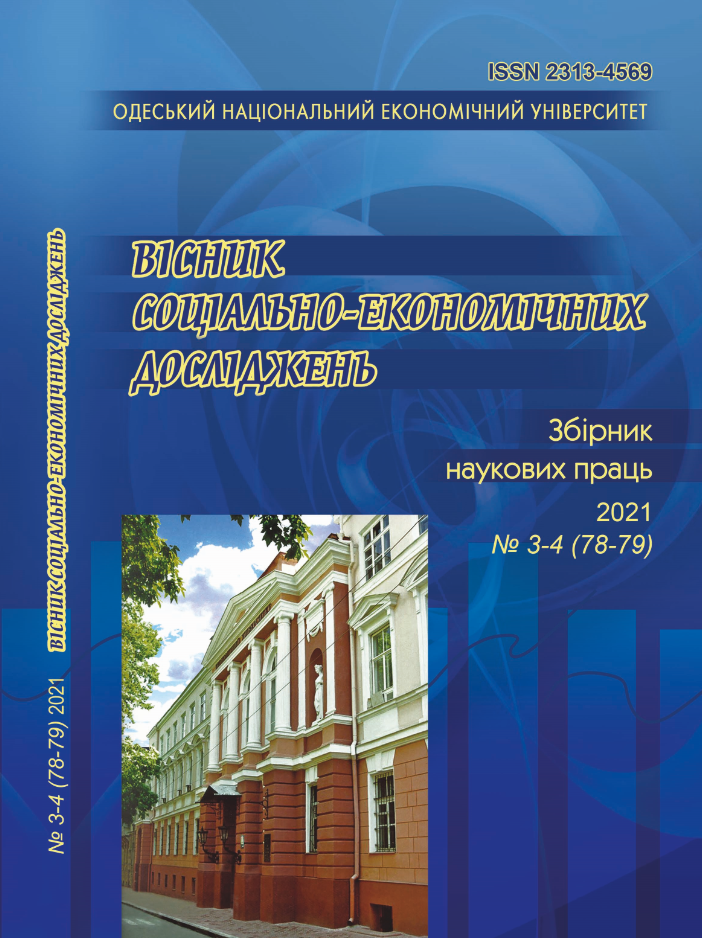THE ROLE AND OBJECTIVES OF MARKETING IN THE CONTEXT OF CIRCULAR ECONOMY DEVELOPMENT
DOI:
https://doi.org/10.33987/vsed.3-4(78-79).2021.54-65Keywords:
circular economy, marketing system, macromarketing, reception, Industry 4.0, digital marketingAbstract
The article considers the role and place of marketing in the socio-economic system, which operates on the principles of a circular economy. The need for a systematic consideration of marketing at the national economy level with involvement of macromarketing categories and concepts is shown. Accordingly, marketing should be considered at two levels: policy at the individual organization level and marketing system level. The subject, object, and tasks of macromarketing in connection with the needs of the circular economy are determined. It is shown that under the influence of Industry 4.0, the uncontrolled development of marketing systems creates risks of inefficient use of resources, non-responsible consumption, and growth of digital inequality, which contradicts of the circular economy goals. In this regard, it is proposed to consider educational programs of responsible consumption and corporate social responsibility policies at the organizations level as tools for ensuring circularity in marketing. The relationship between the use of digital marketing and the requirements for energy saving and energy efficiency is indicated, therefore the widespread introduction of digital marketing is considered as an important step towards ensuring the functioning of the circular economy. It has been proven that the active use of digital technologies in marketing should also lead to an increase in the economic efficiency of organizations and the national economy functioning as a whole in order to ensure the technological innovations necessary for a circular economy. Due to the risk of digital inequality associated with it, deindustrialization, falling household incomes and degradation of the domestic market, and the need to ensure an innovative development trajectory, it is proposed to consider marketing not only as an element of the consumer, but also the innovative subsystem of society. A marketing model is proposed that meets the requirements of a circular economy development in the process of Industry 4.0 developing. Directions for changing/expanding theoretical and methodological approaches to marketing are formulated in accordance with the proposed model.
References
Geissdoerfer, M., Savaget, P., Bocken, N. M. P., & Hultink, E. J. (2017). The Circular Economy – A new sustainability paradigm? Journal of Cleaner Production, Vol. 143, pp. 757–768. DOI: 10.1016/j.jclepro.2016.12.048.
Kirchherr, J., & van Santen, R. (2019). Research on the Circular Economy: A Critique of the Field. Resources, Conservation and Recycling, Vol. 151, 104480. DOI: 10.1016/j.resconrec.2019.104480.
Khan, I. S., Ahmad, M. O., & Majava, J. (2021). Industry 4.0 and sustainable development: A systematic mapping of triple bottom line, Circular Economy and Sustainable Business Models perspectives. Journal of Cleaner Production, Vol. 297, 126655. DOI: 10.1016/j.jclepro.2021.126655.
Trushkina, N. V. (2021). Circular Economics: Concept Formation, Evolution of Development, Barriers, Problems and Prospects [Tsyrkuliarna ekonomika: stanovlennia kontseptsii, evoliutsiia rozvytku, bariery, problemy i perspektyvy], Visnyk ekonomichnoi nauky Ukrainy, № 1, s. 9–20. DOI: 10.37405/1729-7206.2021.1(40).9-20 [in Ukrainian]
Loyko, V. V. (2019). Problems of development of the circular economy in Ukraine [Problemy rozvytku tsyrkuliarnoi ekonomiky v Ukraini], Conference Proceedings of IІI International Scientific Conference From the Baltic to the Black Sea: the Formation of Modern Economic Area, August 23th, 2019, Baltija Publishing, Riga, рр. 24–27 [in Ukrainian]
Li, G., Wu, H., Sethi, S. P., & Zhang, X. (2021). Contracting green product supply chains considering marketing efforts in the circular economy era. International Journal of Production Economics, Vol. 234, 108041. DOI: 10.1016/j.ijpe.2021.108041.
Rajput, S., & Singh, S. P. (2019). Connecting circular economy and industry 4.0. International Journal of Information Management, Vol. 49, pp. 98–113. DOI: 10.1016/j.ijinfomgt.2019.03.002.
Bai, C., Orzes, G., & Sarkis, J. (2022). Exploring the impact of Industry 4.0 technologies on social sustainability through a circular economy approach. Industrial Marketing Management, Vol. 101, pp. 176–190. DOI: 10.1016/j.indmarman.2021.12.004.
Fisk, G. (1967). Marketing Systems: An Introductory Analysis. Harper & Row, New York, xviii, 797 p.
Layton, R. A. (2019). Marketing Systems – Looking Backward, Sizing up and Thinking Ahead. Journal of Macromarketing, Vol. 39, Issue 2, рp. 208–224. DOI: 10.1177/0276146718823897.
Rostow, W. W. (1962). The Process of Economic Growth (Monograph). W. W. Norton & Company, New York, 390 p.
Kotler, P., & Zaltman, G. (1971). Social Marketing: An Approach to Planned Social Change. Journal of Marketing, Vol. 35, Issue 7, pp. 3–12.
Robul, Yu. V. (2011). Holystic concept of marketing performance [Kholistychna kontseptsiia efektyvnosti marketynhu], Marketing and Management of Innovations, No. 4, s. 124–130 [in Ukrainian]
Layton, R. A., & Domegan, C. (2021). The Next Normal for Marketing – The Dynamics of a Pandemic, Provisioning Systems, and the Changing Patterns of Daily Life. Australasian Marketing Journal, Vol. 29, Issue 1, pp. 4–14. DOI: 10.1177/1839334921998514.
Bartels, R., & Jenkins, R. L. (1977). Macromarketing. Journal of Marketing, Vol. 41, Issue 4, pp. 17–20.
Hunt, S. D. (1981). Macromarketing as a Multidimensional Concept. Journal of Macromarketing, Vol. 1, Issue 1, pp. 7–8.
Kadirov, D. (2018). Towards a Theory of Marketing Systems as the Public Good. Journal of Macromarketing, Vol. 38, Issue 3, pp. 278–297. DOI: 10.1177/0276146718767949.
Heeks, R., & Wall, P. J. (2018). Critical realism and ICT4D research. The Electronic Journal of Information Systems in Developing Countries, Vol. 84. Issue 6, e12051. DOI: 10.1002/isd2.12051.
Geels, F. W. (2011). The multi-level perspective on sustainability transitions: Responses to seven criticisms. Environmental Innovation and Societal Transitions, Vol. 1, Issue 1, pp. 24–40. DOI: 10.1016/j.eist.2011.02.002.
Robul, Yu. V. (2020). Marketing Socio-Technological System as the Environment of Functioning of Digital Marketing [Marketynhova sotsio-tekhnolohichna systema yak seredovyshche funktsionuvannia tsyfrovoho marketynhu], International Humanitarian University Herald. Series: Economics and Management, No. 41, s. 11–17. DOI: 10.32841/2413-2675/2019-41-2 [in Ukrainian]
Downloads
Published
Issue
Section
License
Copyright (c) 2021 Socio-Economic Research Bulletin

This work is licensed under a Creative Commons Attribution 4.0 International License.






